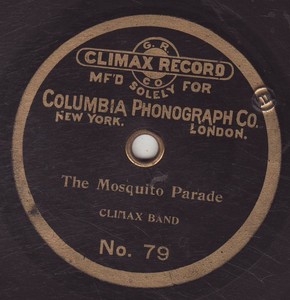This is a blog of stories and comments about early recording. Mainly, but not exclusively about early pioneer disc recording 1895 to 1925. After well over 40 years of collecting, interviewing, studying, digging through old notebooks, files, I am starting to put all of this on a blog. I will be adding much here and some of it will be seeing the light of day for the first time. So hoping you enjoy this journey on sound recording. Full speed astern!
Thursday, October 17, 2013
What was the Columbia record Climax and how did some of the early Climax recordings get on Columbia labels?
Note the stamping on the upper right of the label saying VTM. This recording is from Feb - April. 1902. As the Victor Talking Machine Company bought the Globe Record Company in Jan 1902. This was the first label for the Columbia disc market made between 1901 and 1902.
In mid 1901 the Columbia Graphophone Company got into the disc record market. It was not easy to do and quite a detailed undertaking. But after seeing the success of the Berliner, Zonophone (which was influenced by their company) and most recently for them the Victor records manufactured by Eldridge Reeves Johnson, they knew they needed to get into the fray.
But how does one start a disc record division when you have nothing to make them with? This is when the Columbia Company under the control of Edward Easton took a trip to New Jersey. They had been located in NYC, but they needed a place to make their disc records.
They found a Company called the Globe Record Company to do the job. It was through this group that the earliest of the Columbia records are pressed. This is where it does get a bit confusing. We know Edward Easton who was the head of the Columbia Graphophone Company pushed hard to defeat Victor.
I know that by summer 1901 Columbia is pressing records called Climax records. This is being done in contrast to the Berliner Patents, but it was hit and miss in those days as to who was in control of what. The Climax label would last into 1902 when Columbia made a deal with a company now called the Victor Talking Machine Company. This was the little company that was run by Eldridge Reeves Johnson mentioned before. However now this company was making well over a million a year in the business. Not only that, but Eldridge Johnson had bought the Globe Record Company and to the Columbia Companies embarrassment all of the Climax records would also be imprinted with the initials VTM on each record.
This was one of the main reasons that Columbia came to the table with Victor. Cause although the Victor company did not like to admit it, Columbia had what Victor needed as well as Victor had what Columbia did as well. At this point in 1902 Columbia ceased producing Climax records. (They also had the Joseph Jones Patent granted on December 10, 1901) This was a powerful poker chip and Columbia played it wisely. For this patent, as bogus as it was, would be the patent that would allow the modern method of disc recording. Through this deal was born the Columbia Disc label.
When they came out with their own label called a Columbia Disc Record, some of the old material somehow slipped through the cracks and for a while a number of Climax records would receive Columbia labels. This would make for some confusing business for the rest of 1902 as all recordings in those days with a few exceptions had a spoken announcement in the beginning and many of these Columbia Records were proudly introduced as Climax ones!
.. By 1903 everything with a Columbia Label was a Columbia record and announced so. By late 1903 the announcement would vanish as well as each record had a paper label. So why bother I am sure was the question..I am sure everyone saw that as over kill.
But the history of the Climax record is one full of some fascinating details. A short lived company of which little today is known, but the beginning of the famous Columbia Disc Record. The copies of Climax Records are not at all common today. Every now and then a few are found. But as a general rule they are quite rare today. Pioneers of the recording industry from over 110 years ago!
Subscribe to:
Post Comments (Atom)

No comments:
Post a Comment